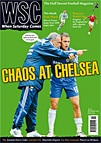Avram Grant’s arrival at Chelsea has been confusing on several levels. Questions posed have included: do the players like him? How long is he going to hang around? And, crucially for journalists, what words do we use to describe him? Grant is undeniably exotic. A Jew, an Israeli and a pal of the owner: a first in every sense.
The Sunday Mirror’s headline Secret network seemed to sum up a general feeling about the whole arrangement. “Grant certainly has friends in high places,” the paper noted on September 23. Many picked up on Grant’s “charm” (Daily Mirror: “Grant has a reputation as a charmer”). In the Daily Telegraph on September 1, Jeremy Wilson wrote that “his charming personality… perhaps best explains his sudden rise to the helm of one of world football’s powerhouses”. Secret networks, friends of friends: sound familiar? Well, yes, actually. It sounds a bit like football
Grant may or may not be charming, but it is tempting to wonder if this kind of stuff might be half-intended shorthand for something else. Particularly when other journalists looking for a handle on the newcomer have noted a lack of charm. “Avram Grant, someone who could be mistaken for Herman Munster,” wrote Sue Carroll in the Daily Mirror on September 26, no doubt deliberately picking up on the media-studies definition of the Munsters as a metaphor for the Jewish family cutting an exotic dash in suburban America. Henry Winter in the Daily Telegraph noted that Grant “resembles a middle‑ranking executive in a suburban Tel Aviv accountancy firm”, someone with “little charisma”.
Some of the coverage could easily be misinterpreted. Particularly in the Telegraph, a paper that has felt the need to remind us seven times in the last 18 months that – for all that it’s relevant to his ownership of Chelsea – Roman Abramovich is Jewish.
It all reads a bit like sports writers out of their comfort zone; attempting to write in the usual broad generalisations, while awkwardly skirting around different kinds of broad generalisation. Martin Samuel of the Times, who is of Jewish background, addressed this subject in his column on October 3: “A modern, politically enlightened Chelsea fan is still left grappling with a way of describing the ‘jobs for the boys’ culture that seems to have gripped his club, without being carelessly labelled a fascist.” At least if he wins a few matches soon Grant may become just another football manager for a while. A manager who, like pretty much every single one of his peers, has arrived in his position via football’s usual hodgepodge of connections, old-pals-acts, best buddies and the old trick of charming the chairmen.
From WSC 249 November 2007
